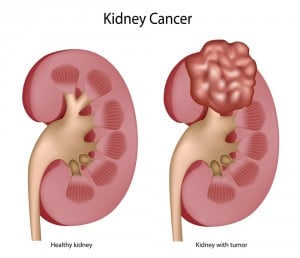Diagnosis of Kidney Cancer
If you have any questions, to schedule a consultation or if you need a second opinion, please contact us or call 1-(646) 663-5515
Dr. Alex Shteynshlyuger is an experienced board-certified urologist in NYC. He specializes in the treatment of men and women with kidney cysts, masses, renal cancer and angiomyolipoma (AML).
 Physical examination and medical history: An exam of the body to check general signs of health, including signs of disease such as palpation of the site of pain or abdominal mass. A history of the patient’s health habits and past illnesses and treatments is obtained.
Physical examination and medical history: An exam of the body to check general signs of health, including signs of disease such as palpation of the site of pain or abdominal mass. A history of the patient’s health habits and past illnesses and treatments is obtained.
- Laboratory tests include serum creatinine, hemoglobin, leukocyte counts, platelet counts, lactate dehydrogenase, and serum calcium as well as C-reactive protein, and erythrocyte sedimentation rate.
- Urinalysis: A test to check the color of urine and its contents, such as sugar, protein, red blood cells, and white blood cells.
- Imaging: diagnosis is usually suggested by:
- Ultrasonography: A procedure in which high-energy sound waves (ultrasound) are bounced off internal tissues or organs and make echoes. The echoes form a picture of body tissues called a sonogram. Ultrasound is not typically used for evaluation of a renal mass except in rare circumstances where the patient cannot have CT or MRI which provide more reliable information.
- Computed tomography (CT) scan with IV contrast: A procedure that makes a series of detailed pictures of areas inside the body, taken from different angles. The pictures are generated by a computer linked to a CT machine. IV dye may be injected into a vein or swallowed to help the organs or tissues show up more clearly. Tumor enhancement after administration of IV dye is suggestive of malignancy. CT is the preferred imaging modality for renal masses.
- Magnetic resonance imaging (MRI): A procedure that uses a magnet, radio waves, and a computer to make a series of detailed pictures of areas inside the body. It may provide additional information in investigating local advancement.
- Biopsy: The removal of cells or tissues so they can be viewed under a microscope by a pathologist to check for signs of cancer. To do a biopsy for renal cancer, a thin needle is inserted into the tumor and a sample of tissue is withdrawn. This provides the confirmation of malignancy with high sensitivity and specificity.[8]
If you have any questions, to schedule a consultation or if you need a second opinion, please contact us or call 1-(646) 663-5515
Dr. Alex Shteynshlyuger is a board-certified urologist in NYC. He specializes in the treatment of men and women with kidney cysts, masses, renal cancer and angiomyolipoma (AML).
